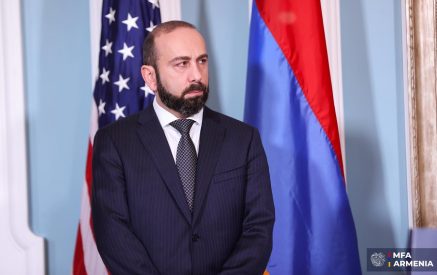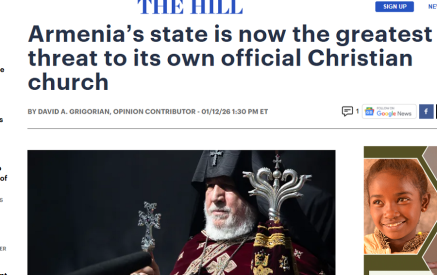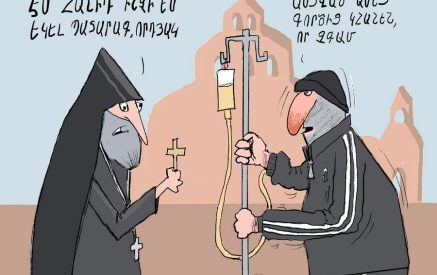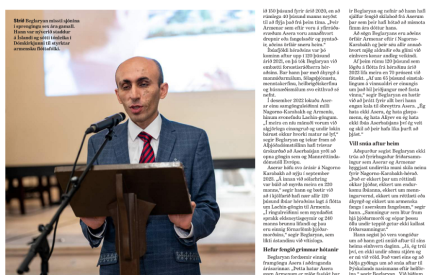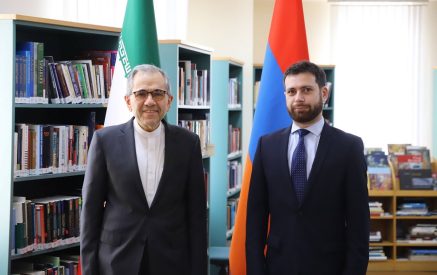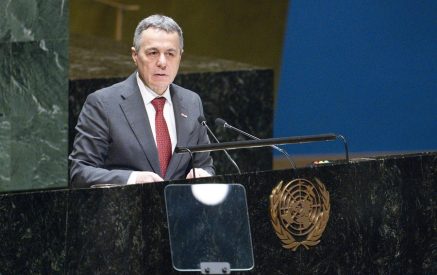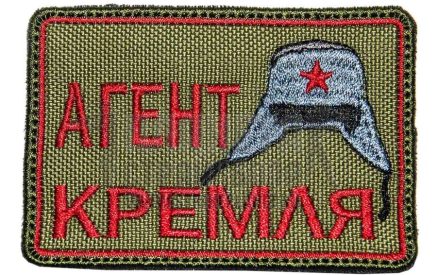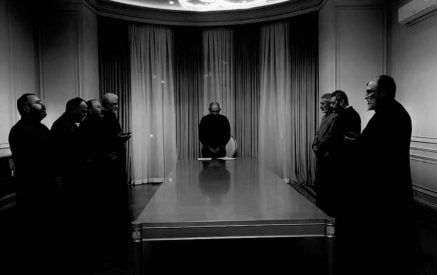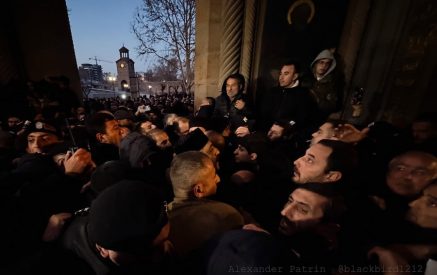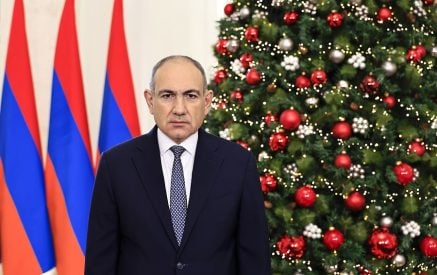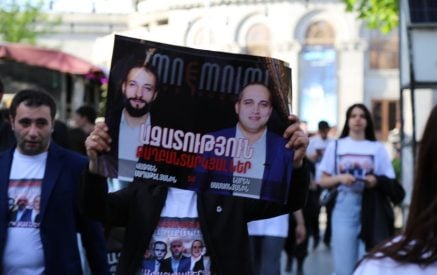PREFACE
- Attorney Aleksandr Kochubaev represents clients in several high-profile political cases. His clients include former judges, opposition figures, individuals arrested during peaceful protests, and others.
- On October 16th of this year, officers from the National Security Service (NSS) arrested A. Kochubaev on Arshakunyats Avenue in Yerevan. A video circulating online shows NSS officers, wearing masks, forcibly removing him from his vehicle and roughly laying him down on the roadway.
- It was later revealed that the reason for the arrest was a post made by Kochubaev on the social media platform Facebook, in which he strongly criticized the ongoing persecution of the clergy of the Armenian Apostolic Church, using harsh language.
- Criminal proceedings were initiated against Kochubaev under Article 490, Part 2 of the Criminal Code, for “publicizing defamatory information or information otherwise damaging the rights and lawful interests of” a judge, prosecutor, or investigator—an offense of medium gravity.
CHARGES
- The charges brought against Kochubaev are based on an article that clearly does not match the alleged offense. The act under Part 2 of Article 490 of the Armenian Criminal Code, which A. Kochubaev is accused of, is as follows:
“Article 490
Publicizing defamatory information or information otherwise damaging the rights and lawful interests of a judge, prosecutor, investigator (…) in connection with their lawful official or professional activities
Read also
shall be punished by (…) imprisonment for a term of two to five years.”
- The key phrase here, “publicizing defamatory information or information otherwise damaging the rights and lawful interests” of the aforementioned persons, pertains to statements of fact, not insult. These two concepts have been distinguished by the European Court of Human Rights decades ago, emphasizing that a statement of fact can be proven, whereas insults cannot. An insult is a value judgment, and requiring to prove it violates the right to freedom of opinion.
- As for insults, the Criminal Code provides for such an offense under Article 489, which applies to insults directed at the court and is stated as follows:
“Article 489
- Contempt of court expressed by insulting the person participating in proceedings
shall be punished by (…) imprisonment for a term of maximum one month. - Contempt of court expressed by insulting the judge in relation to exercising official powers
shall be punished by (…) short-term imprisonment for a term of maximum two months.”
- The two offenses defined under Articles 489 and 490 of the Criminal Code of the Republic of Armenia differ in terms of severity. According to the Criminal Code, an offense is considered of minor gravity if the maximum penalty of imprisonment does not exceed two years, while medium gravity offenses carry a maximum penalty of up to five years’ imprisonment.
- If we assume that both Article 489 and Article 490 criminalize insulting a judge, then one of the provisions becomes redundant. This raises the question: in cases involving insults directed at a judge, under which article should the individual be prosecuted and punished? The issue is further complicated by the fact that these offenses differ in terms of their gravity, applicable penalties, and sentencing ranges.
- The fact that the charge brought against A. Kochubaev under Article 490 pertains solely to statements of fact is evident from an analysis of similar provisions in the Criminal Code. The distinction between statements of fact and insults is more clearly delineated in two other articles of the Code, which address comparable offenses, this time involving the Human Rights Defender. These are:
Article 493
“Publicizing of defamatory information or other information damaging the rights and lawful interests of the Human Rights Defender (…)”
and
Article 494
“Insulting or showing undisguised disrespect to the Human Rights Defender, in connection with his/her official activities”
- In the case of offenses against the Human Rights Defender, it is clear that the Criminal Code draws a distinct line between defamatory statements of fact and insults, which are treated as separate offenses. A comparison shows that Article 489 (insulting the court) corresponds to Article 494 (insulting the Human Rights Defender), while Article 490 (defamatory information about certain officials) aligns with Article 493 (defamatory information about the Human Rights Defender).
- In the case of the Ombudsman, both types of actions (publishing defamatory statements of fact and expressing insults) are prohibited, albeit with different penalties. However, this is not the case when it comes to officials from law enforcement bodies. Investigators, prosecutors, and other officials listed under Article 490 are protected under criminal law only from defamatory statements of fact, not from insults. Only the court and the Human Rights Defender are protected from insults under the Criminal Code.
- Other officials, including investigators and prosecutors, may only benefit indirectly from criminal protection against insults under Part 1 of Article 489—but only if the insult directed at them is deemed an expression of disrespect toward the court. This scenario is limited to the course of legal proceedings, and therefore does not apply here. Regardless, such an act would still only qualify as an offense of minor gravity.
- A. Kochubaev ’s Facebook post consists exclusively of value judgments. Whether these amount to an insult can be assessed within the framework of fair legal proceedings. However, under no interpretation can such expressions be considered as statements of fact, since they are not verifiable, and therefore, Article 490 does not apply.
DETENTION
- Attorney A. Kochubaev has been placed in pre-trial detention for a period of two months. Notably, he has no prior criminal convictions, a fact explicitly stated in the detention order. The decisive factor in this case was the selection of Article 490, Part 2 of the Criminal Code — a provision underlying a demonstrably false charge.
- Under Armenian law, a person who has committed a minor offense for the first time cannot be sentenced to imprisonment. Pre-trial detention may not be applied if the alleged offense is not punishable by imprisonment and if the conditions for other preventive measures have not been violated.
- As noted above, the act defined under Article 490, Part 2 of the Criminal Code — the basis for the charges against A. Kochubaev — constitutes an offense of medium gravity, which in itself does not automatically preclude detention. However, since the Facebook post serving as the basis for the charge contains no statements of fact, the most serious applicable provision could only have been Article 489.
- Since the offense under Article 489 is of a minor gravity and given that A. Kochubaev has no prior convictions, he could not, even theoretically, be sentenced to imprisonment for such an offense; accordingly, the pre-trial detention should not have been applied in his case. Therefore, there is no legal basis for depriving A. Kochubaev of his liberty. Any interpretation to the contrary would distort the meaning of the right to liberty and its procedural safeguards.
- The purpose of Article 5 of the European Convention on Human Rights, which guarantees the right to liberty and security of a person, is to prevent arbitrary deprivation of freedom, a principle consistently reaffirmed in numerous judgments of the European Court of Human Rights.
- The UN Working Group on Arbitrary Detention defines arbitrary detention as follows:
“The notion of ‘arbitrary’ includes both the requirement that a particular form of deprivation of liberty is taken in accordance with the applicable law and procedure and that it is proportional to the aim sought, reasonable and necessary. ‘Arbitrariness’ is not to be equated with ‘against the law’, but must be interpreted more broadly to include elements of inappropriateness, injustice, lack of predictability and due process of law.”
CONCLUSION
- The charge brought against A. Kochubaev does not correspond to his alleged act. It was selected in violation of the law in order to create an artificial basis for his detention. In accordance with international human rights standards, A. Kochubaev has been subjected to arbitrary detention.
- The false accusation, the excessive and intimidating manner of his arrest, and the unlawful deprivation of liberty all indicate that the attorney is being subjected to politically motivated punishment.
- Since no factual evidence exists in the case other than A. Kochubaev ’s Facebook post, any legal assessment must be based solely on the content of that post and the provisions of the Criminal Code and Criminal Procedure Code of the Republic of Armenia.
RECOMMENDATION
- We call upon the addressees of this statement to immediately examine, within the scope of their mandates, the case of the arbitrary detention of Alexander Kochubaev , a member of the Chamber of Advocates of the Republic of Armenia.
- We further urge them to engage with the Armenian authorities and draw their attention to this matter.
NOTICE
The circumstances referenced in this statement should not be interpreted as implying that, in the view of the Armenian Center for Political Rights, attorney Alexander Kochubaev has violated any law. The purpose of this statement is solely to substantiate the fact of arbitrary detention, without excluding the possibility that other rights of the attorney may also have been violated.
Given the response of law enforcement authorities in Armenia, we emphasize that the Facebook post forming the basis of the charges against attorney A. Kochubaev is included for reference purposes only, to make sure that readers understand the factual context of this ACPR statement.
Armenian Center for Political Rights
1. Video depicting A. Kochubaev’s detention is available here https://drive.google.com/file/d/1EHgvmz1iPlIHv6_89iugZpZSmyXzVu-b/view
2.The post is available in A. Kochubaev’s Facebook profile, https://www.facebook.com/alexandr.kochubaev/posts/pfbid02wbsKA2cWrccug4CMD5bVDo5y6XVVLTqAd56JMWu18ksjPsC2Gn8nEsQY96HfFmRil
3. See, inter alia, Morice v. France [GC], § 126; Lingens v. Austria, § 46
4. See Article 17 of the Criminal Code of the Republic of Armenia
5. See the photos of the court order published by A. Kochubaev’s lawyer Roman Yeritsyan, https://drive.google.com/drive/folders/1z4zVbldlZrDSIOcS-NOSuTOAqrejul1A?usp=sharing
6. See part 5 of Article 67 of the Criminal Code of the Republic of Armenia
7. See part 3 of Article 118 of the Criminal Procedure Code of the Republic of Armenia
8. See, inter alia, Selahattin Demirtaş v. Turkey (no. 2) [GC], 2020, § 311, S., v. and A. v. Denmark [GC], 2018, § 73; McKay v. the United Kingdom [GC], 2006, § 30։
9.See the website of the Office of the High Commissioner for Human Rights, https://www.ohchr.org/en/about-arbitrary-detention






